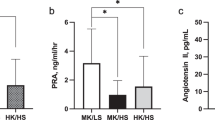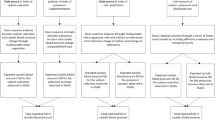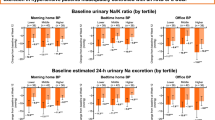Abstract
The existence of a heterogeneous blood pressure (BP) response to salt intake, a phenomenon known as salt sensitivity, has increasingly become a subject of clinical hypertension research, and has important clinical and prognostic implications. However, two different methodologies are currently used to diagnose salt sensitivity. The aim of the present study was to compare the BP response to intravenous sodium load and depletion on the one hand, and to changes in dietary salt intake on the other, in order to assess salt sensitivity in a group of essential hypertensive patients. Twenty-nine essential hypertensives underwent two different procedures separated by 1 month: a dietary test consisting of a 2-week period of low (20 mmol/day) and high (260 mmol/day) salt intakes, and an intravenous test consisting of a 2 litre saline load over a 4-h period, followed by 1 day of low (20 mmol) salt intake and furosemide (40 mg/8 h orally) administration. BP was registered at the end of every period using 24-h ambulatory BP monitoring. In the whole group of hypertensive patients studied, both low salt intake and furosemide administration significantly (P < 0.01) decreased mean BP. Correlation coefficients of BP changes obtained using the two methodologies were between 0.3 and 0.4. Moreover, coefficients of agreement between the oral and the intravenous tests, using several cut points for BP changes, were systematically below 0.5, thus indicating a misclassification of salt sensitivity greater than 50%, depending on the method used. None of the cut points for BP changes during furosemide administration showed a good combination of sensitivity and specificity compared with changes in response to low dietary salt. The present results indicate that the diagnosis of salt-sensitive hypertension should be based on the BP response to changes in dietary salt intake, while BP response to saline and furosemide administration leads to a systematic misclassification of more than 50% of patients, even using different cutpoints for changes in BP.
This is a preview of subscription content, access via your institution
Access options
Subscribe to this journal
Receive 12 digital issues and online access to articles
$119.00 per year
only $9.92 per issue
Buy this article
- Purchase on Springer Link
- Instant access to full article PDF
Prices may be subject to local taxes which are calculated during checkout
Similar content being viewed by others
References
Muntzel M, Drüeke T . A comprehensive review of the salt and blood pressure relationship Am J Hypertens 1992 5: 1S–42S
Campese VM . Salt sensitivity in hypertension. Renal and cardiovascular implications Hypertension 1994 23: 531–550
Weinberger MH . Salt sensitivity of blood pressure in humans Hypertension 1996 27: 481–490
de la Sierra A et al. Assessment of salt sensitivity in essential hypertension by 24-h ambulatory blood pressure monitoring Am J Hypertens 1995 8: 970–977
Giner V et al. Renin-angiotensin system genetic polymorphisms and salt sensitivity in essential hypertension Hypertension 2000 35: 512–517
de la Sierra A et al. Fluid, ionic and hormonal changes induced by high salt intake in salt-sensitive and salt-resistant hypertensive patients Clin Sci 1996 91: 155–161
Bragulat E, de la Sierra A, Antonio MT, Coca A . Endothelial dysfunction in salt sensitive hypertension Hypertension 2001 37: 444–448
de la Sierra A et al. Increased left ventricular mass in salt-sensitive hypertensive patients J Hum Hypertens 1996 10: 795–799
Morimoto A et al. Sodium sensitivity and cardiovascular events in patients with essential hypertension Lancet 1997 350: 1734–1737
Sullivan JM . Salt sensitivity. Definition, conception, methodology, and long-term issues Hypertension 1991 17 (Suppl I): 161–168
Weinberger MH, Stegner JE, Fineberg NS . A comparison of two tests for the assessment of blood pressure responses to sodium Am J Hypertens 1993 6: 179–184
Sharma AM, Schorr U, Cetto C, Distler A . Dietary v intravenous salt loading for the assessment of salt sensitivity in normotensive man Am J Hypertens 1994 7: 1070–1075
Galletti F et al. Evaluation of a rapid protocol for the assessment of salt sensitivity against the blood pressure response to dietary sodium chloride restriction Am J Hypertens 1997 10: 462–466
Cusi D et al. Polymorphisms of alpha-adducin and salt sensitivity in patients with essential hypertension Lancet 1997 349: 1353–1357
Poch E et al. Genetic variation of the γ subunit of the epithelial Na+ channel and essential hypertension. Relationship with salt sensitivity Am J Hypertens 2000 13: 648–653
Gradual NA, Galløe AM, Garred P . Effect of sodium restriction on blood pressure, renin, aldosterone, catecholamines, cholesterols, and triglyceride. A meta-analysis JAMA 1998 279: 1383–1391
Chobanian AV, Hill M . National Heart, Lung, and Blood Institute Workshop on sodium and blood pressure. A critical review of current scientific evidence Hypertension 2000 35: 858–863
Author information
Authors and Affiliations
Corresponding author
Rights and permissions
About this article
Cite this article
de la Sierra, A., Giner, V., Bragulat, E. et al. Lack of correlation between two methods for the assessment of salt sensitivity in essential hypertension. J Hum Hypertens 16, 255–260 (2002). https://doi.org/10.1038/sj.jhh.1001375
Received:
Revised:
Accepted:
Published:
Issue Date:
DOI: https://doi.org/10.1038/sj.jhh.1001375
Keywords
This article is cited by
-
HIV-positive demonstrate more salt sensitivity and nocturnal non-dipping blood pressure than HIV-negative individuals
Clinical Hypertension (2021)
-
Biochemical interaction of salt sensitivity: a key player for the development of essential hypertension
Molecular and Cellular Biochemistry (2021)
-
Salt Sensitivity: Challenging and Controversial Phenotype of Primary Hypertension
Current Hypertension Reports (2016)
-
Genetics of Salt-Sensitive Hypertension
Current Hypertension Reports (2011)
-
Potential Dopamine-1 Receptor Stimulation in Hypertension Management
Current Hypertension Reports (2011)



